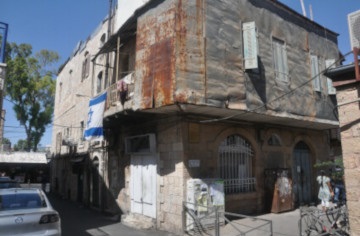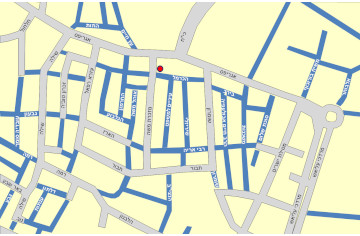Rachel Kramer - Meir's Fiancée
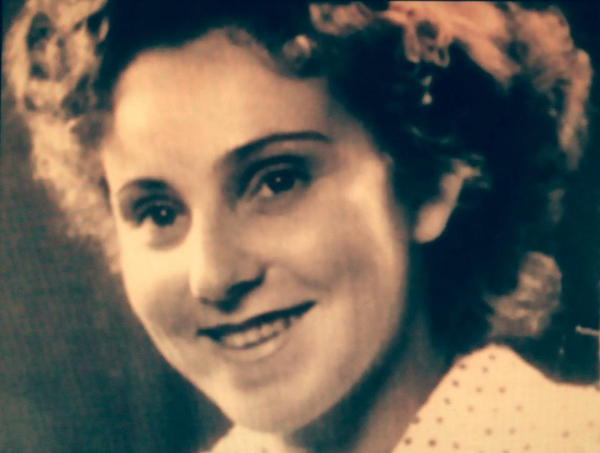
At a very young age, Rachel Kramer was secretly engaged to Meir Feinstein. Their love and hopes to build a family in Eretz Israel were tragically halted by the heroic events of April 1947. Rachel never fully recovered from the loss of the one true love of her life, Meir Feinstein. A few years after Meir's death, she got married, and eventually had three lovely children, Roni, Chemda and Oded Meir. However, she led a turbulent life. She never stopped mourning Meir, and never missed a memorial ceremony for her fallen hero.
Rachel Kramer was the only child of Alexander and Chaya Kramer, who lived in the "Maskeret Moshe" neighborhood of "Nachlaot," in Jerusalem. In those times, the Kramer family was perhaps the only Ashkenazi family among their neighbors of Latino-speaking Sephardic Jews. Alexander Kramer was the principal of the "Kiach" elementary school for boys and girls, and he became a prominent educator in Jerusalem. Rachel, who was born on August 15, 1929, was a very gifted child. Her daughter, Chemda, reported that she was so good academically that she skipped one class, and that she was always very mature for her age.
Rachel grew up with little interest in the politics of the times. Her father, Alexander Kramer, was pro-British and opposed the Irgun and Lehi underground organizations. Rachel was a very beautiful girl, and several young men in Jerusalem had their eye on her. Two, in particular, were intensely interested in Rachel, and she chose Meir Feinstein from the Irgun over Ephraim Rechtman from the Haganah. As her future son, Oded Meir Amitai, said Meir Feinstein was Rachel's only true love. She was so in love with him that she joined the Irgun to "make sure that the other girls of Irgun do not capture Meir's affection."
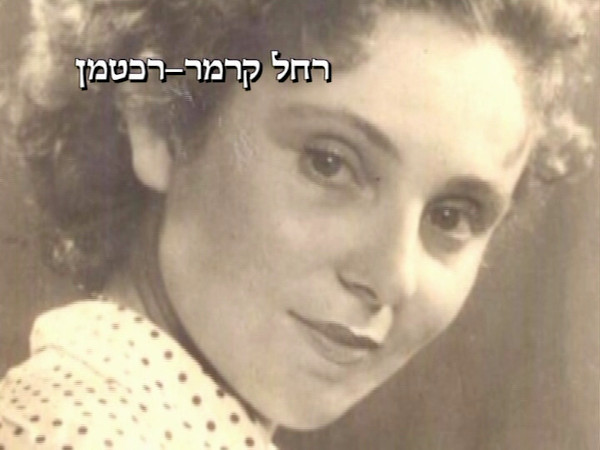
In August or September of 1946, Rachel and Meir were secretly engaged to be married. They kept their engagement secret because her father, Alexander, despised the Irgun and would not accept Meir, the Irgun member, into his family. Only a few months later, Meir participated in the fatal attack on the Jerusalem's main train station. From the time that Meir was captured and injured until his tragic death, Rachel was very publicly active in her efforts to save him.
My father provided his detailed testimony for these efforts in his book Yedidya Hatalgi. Rachel and Meir's family did their best to convince Meir to sign a pardon request with the British government of Eretz Israel. Meir was very adamantly against any pardon request. At Meir's funeral, Rachel read the following heart breaking eulogy:
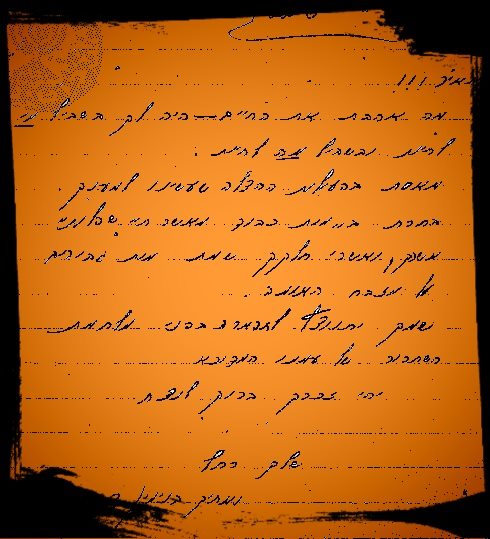
"Meir!!!
You loved life so much - you had someone to live for... and you had so much to live for.
You resented so much the efforts we did to save your life.
You have chosen an honorable death rather than living low life.
You are fortunate that you have died a heroic death on the altar of our nation.
Your name will glitter with all its glory in front of the independence war of our depressed people.
May your memory be blessed for ever.
Yours Rachel
and your brothers Binyamin and Zvi.
"
I have to admit that I cannot read her letter with dry eyes, especially knowing all the efforts that they made to save Meir, and learning about her never-ending love for Meir, decades after his death.
The Hamashkif newspaper of May 22, 1947, reported that Rachel was incarcerated on the day she delivered this speech. The title of the clip says that "Feinstein's fiancée was arrested." It then says: "On the thirties day for the death of Meir Feinstein HYD at the condemned men cell in the Jerusalem Prison, in the morning when his family and friend were planning to go to his grave - the British CID arrested Meir's fiancée, Rachel Kramer."
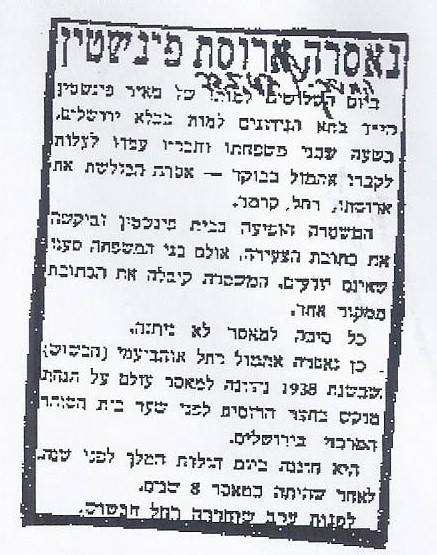
"The police arrived at the Feinstein's home and asked for the address of this young woman, but the family said that they do not know her address. The police received her address from a different source. No reason was given for her arrest."
Rachel Kramer and Meir's Legacy
Rachel was deeply involved in the efforts to keep Meir's legacy after the independence of the state of Israel. During the first twenty years, the Mapai government in Israel, under David Ben-Gurion, did everything it could to suppress the memory of Meir Feinstein, Moshe Barazani and all the other Olei Hagardom. The Central Prison of Jerusalem was used as a storage area for the government's institutions. In 1967, after Menachem Begin and his party, Herut (the precursor of today's Likud party), joined the Israeli unity government, the Jerusalem Prison in the Russian Compound was restored as the "Hall of Heroism." The following pictures show Rachel Kramer-Rechtman in the first memorial for Feinstein and Barazani that was held at the prison (before the conversion of the prison to the Museum of the Underground Prisoners).
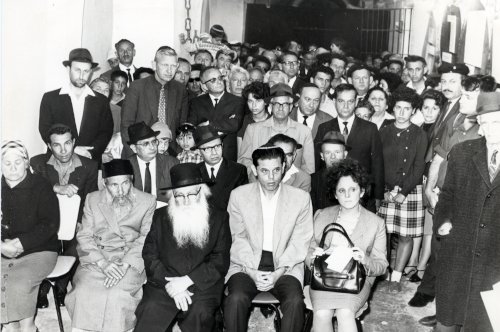
Sitting from left to right in the first row are Lulu Barazani and Chacham Avraham Barazani, Moshe's parents, Rabbi Aryeh Levin, the "Rabbi of the Prisoners," my father Binyamin Feinstein, and Rachel Kramer-Rechtman. On the second row, sitting between Rabbi Levin and my father is Menachem Begin, Meir's Irgun commander and the sixth prime minister of the state of Israel. One can see the pain in Rachel's face as she closed her eyes and reflected upon her tragic loss twenty years earlier.
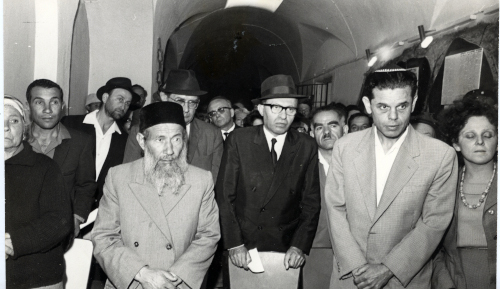
In this close-up picture of Rachel and my father, the crowd is standing up during Rabbi Levin's speech. It is worth mentioning that the seventh prime minister of the state of Israel, Yitzhak Shamir, who was one of the three commanders of the Lehi, is standing between my father and Menachem Begin.
Rachel participated in all the ceremonies commemorating Meir until her death in 1984, at a relatively young age. Her children continue to participate in all these events and proudly maintain her legacy until this day. On my last visit in May 2019, we took the following picture with Rachel's children, Chemda and Oded Meir.
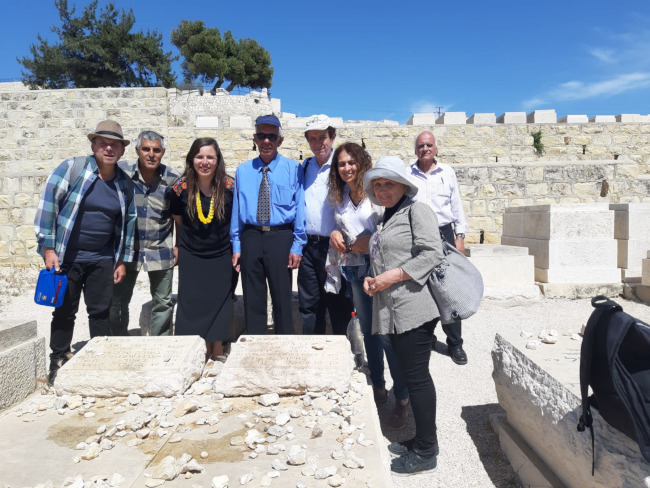
At the graves of Meir and Moshe: Oded Meir Amitai, the son of Rachel Kramer-Rechtman is on the left of Moshe's grave, and Chemda Elias-Rechtman, Rachel's daughter, is standing on the right of Meir's grave. I am standing to the right of my brother Eliezer, and our guide, Hodaya Alter, is standing to the left of Eliezer. Picture courtesy of Hodaya Alter.
Reclaiming Meir's Grave After the Six-Day War
The war of Israeli independence ended in 1948, the year following the death of Meir and Moshe. The old city of Jerusalem and Mount Olive cemetery were seized by Jordan, becoming off-limits for all Israelis. And then, like a miracle from heaven, came the reunification of Jerusalem after the Six-Day war in June 1967.
I will never forget the joy in my father's face when he told us, a few days after the end of the Six-Day war, that he and Rachel received special permission to go to Mount Olives Cemetery and to search for Meir's grave. My father liked to make 8mm home movies, and in the following rare film you can see glimpses of the actual search for Meir's grave. I regard this video as one of the most important contributions to this site and to the legacy of my uncle; and I dedicate it to the blessed memory of Binyamin Feinstein and Rachel Kramer-Rechtman.
My father was one of the early adopters of 8mm home movies in Israel, and he usually had to explain to the people he filmed that this was really a movie. He had a low-budget Kodak movie camera, and he tried to use the five-minute allotment of each roll very sparingly. I must have inherited my love for video taking and editing from him. This video was re-created from two of his rolls. He meticulously marked the contents on each of his 8mm film rolls. The first roll had the marking "Looking for Meir's grave on Mt. Olives with Rachel. Visit to Dead Sea. Executive visit around the old city of Jerusalem. Beit-Lechem..." and contributed about 45 relevant seconds. The second roll was marked "Passover in Haifa. Visit to Meir's grave on Mt. Olives. Ein-Pascha. Acre. ...4/30/68" and it contributed about 20 seconds. I had to use multiple image freezes (of frames that somehow retained acceptable quality) in order to recreate the current film.
Rachel and Binyamin arrived at Mount Olives in June 1967 with a deep fear that the tombs of Meir and Moshe would be gone since they heard that many graves were desecrated by the Jordanians during their 20-year control over the old city of Jerusalem. Hodaya Alter described the desecration of the graves in the cemetery in the video I recorded during a May 2019 trip to Mount Olives.
In the first part, the re-created video shows how much they were both relieved to find Meir's grave at the same spot they remembered all these years. Binyamin captured Rachel kneeling for the first time in 20 years near the grave of her beloved fiancé. Rachel captured Binyamin happy to be again so closed to his brother's resting place.
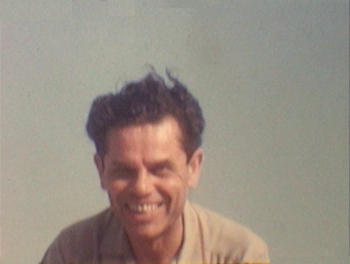
Binyamin Feinstein after
he found his brother's grave.
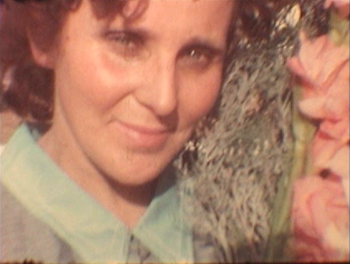
Rachel Kramer-Rechtman after
she found Meir's grave.
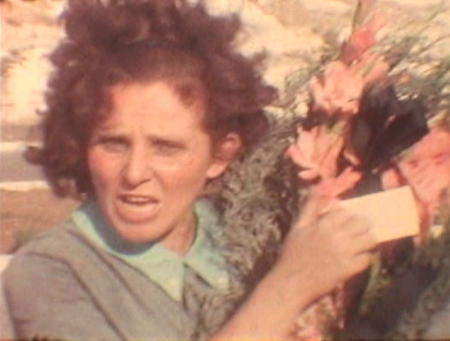
Rachel with wreath of pink
flowers for Meir.
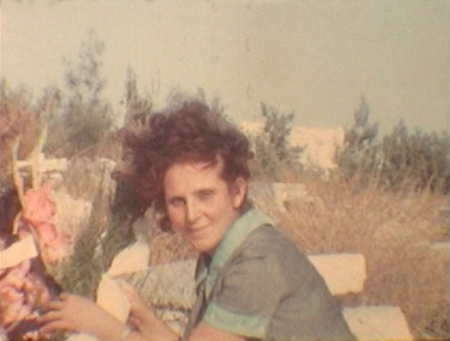
Rachel kneeling on
Meir's grave.
In the second part of the re-created video, they drove to the Dead Sea, using the shortest route from Jerusalem that was just liberated. They spotted a deserted Jordanian tank from the war that had ended few days earlier. Like the few other Israelis that had special permits to travel there, they celebrated Israel's amazing victory. Even Rachel was dancing near the tank, on the joyous day she was able to come back to the grave of "the love of her life."
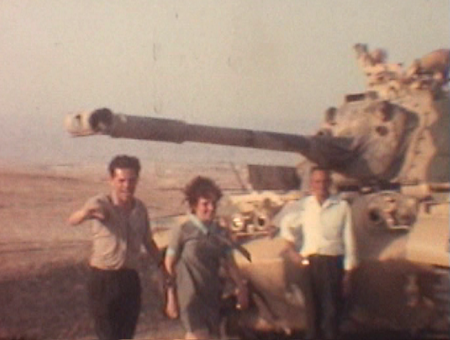
The third part of the re-created video shows the first memorial in Mount Olives Cemetery for Feinstein and Barazani after the Reunification of Jerusalem. The memorial was held on April 1968, and it shows Rachel with a beautiful wreath of pink flowers, similar to the flowers she brought to the grave eight months prior. Special credit goes to my brother, Eliezer, who first identified Menachem Begin among the leaders of the Irgun and Lehi organizations who attended this memorial. I marked Begin with a red circle, and yes, it is very hard to identify him.
Oded Meir Amitai: The Life of My Mother, Rachel Kramer-Rechtman
I first met Oded Meir Amitai during my visit to Israel in May 2019. I felt immediately connected to this impressive, nice and deeply sensitive person, who could have been my cousin, since his mother was my uncle Meir's fiancée. In the following video, Oded tells the compelling story of his mother for the first time in public. As you can see, he was very emotional, very frank, and in the recording background, you may occasionally hear my enthusiastic response.
My father, Binyamin Feinstein, told us about Rachel Kramer as part of Meir's life, and Eliezer and I met her during our childhood on several occasions. However, Oded's speech gave me the first opportunity to really learn about Rachel's amazing and turbulent life, before and after the dramatic events of 1946 and 1947. I recorded Oded's speech during the Reshit Jerusalem's conference memorial on Feinstein and Barazani that was held on May 5, 2019, at the Museum of the Underground Prisoners in Jerusalem. The Hebrew title of the speech can be loosely translated as "The story which never ended in 1947 but continues with me even today." This video is about the truly remarkable life of Rachel Kramer-Rechtman.
Oded begins with the story of his grandparents, Alexander and Chaya Kramer, and their only child Rachel. They were the only Ashkenazi family in the Maskeret Moshe neighborhood. Two young men courted Rachel, and she chose Meir Feinstein from the Irgun over Ephraim Rechtman from the Haganah. Because her father, Alexander, was pro-British and opposed the Jewish underground, Rachel and Meir were secretly engaged around August or September of 1946. Rachel joined the Irgun, and after the death of Meir, she joined the Lehi.
Several years after Meir's death, Rachel surprisingly married Ephraim Rechtman, the former member of the Haganah and Meir's earlier courting rival. In the speech, Oded tells how during his childhood, he realized that the events of 1947 and 1948 never really ended. He was always referred to "as the son of Rachel Kramer, the fiancée of Meir Feinstein of the Irgun" by his teachers. His neighbors always talked about Rachel's beauty and the tragic end of her romantic relationship with Meir Feinstein, "Rachel Kramer's true and only love." Oded's compelling story is one of my major sources for this page. I hope you enjoy this video as much as I did editing it and translating it to English.
